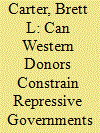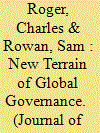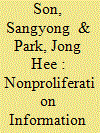|
|
|
Sort Order |
|
|
|
Items / Page
|
|
|
|
|
|
|
| Srl | Item |
| 1 |
ID:
193107


|
|
|
|
|
| Summary/Abstract |
There is limited evidence that reliance on foreign aid from Western donors compels repressive governments to embrace democratic reforms and respect citizens’ rights. However, donors have another, potentially more powerful source of financial leverage: debt relief. This paper exploits two features of the Heavily Indebted Poor Countries (HIPC) debt relief initiative, launched by the International Monetary Fund and World Bank in 1996, to probe whether Western leverage has constrained repression across Africa. First, the Bretton Woods institutions initiated debt relief negotiations with virtually all African governments. Second, many recipients were in power long before HIPC negotiations began and remained after they concluded. Using a differences-in-differences estimator, I show that the daily rate of repression fell by between 10% and 30% during debt relief negotiations. This effect holds across autocracies and democracies, and during periods of sustained protests. When debt crises were more severe, debt relief negotiations were even more constraining.
|
|
|
|
|
|
|
|
|
|
|
|
|
|
|
|
| 2 |
ID:
193103


|
|
|
|
|
| Summary/Abstract |
This paper revisits the latest statistical evidence for the nuclear emboldenment thesis—nuclear-armed states are more likely to initiate military aggression than non-nuclear states—from (Bell and Miller 2015). If correct, their findings have important theoretical and policy implications regarding the effect of nuclear proliferation on international conflict. This paper shows, however, that Bell and Miller’s findings heavily rely on two important components of their statistical analysis: (1) using all state dyad observations, and (2) employing pooled regression models to analyze time-series-cross-sectional (TSCS) data. I argue that those components are based on questionable assumptions on heterogeneity in their dataset. Based on alternative strategies dealing with heterogeneity in dyadic data, my reanalysis shows that the emboldening effect of nuclear weapons is not as robust as originally claimed. Instead, I find the robust deterrent effect of nuclear weapons: nuclear-armed states are less likely to be targeted in military disputes. These findings highlight the need for careful application of quantitative methods to produce a more robust understanding of nuclear issues.
|
|
|
|
|
|
|
|
|
|
|
|
|
|
|
|
| 3 |
ID:
193108


|
|
|
|
|
| Summary/Abstract |
Over the last 12 years, Mexico has become one of the most dangerous places to be a journalist. We examine how this risk-environment influences the content and strategies of reporting at one of Mexico’s most well known national newspapers, Reforma. We argue that as the risk environment worsens, journalists use less specific language about armed actors to report on violent events. To test our claims, we turn to three novel sources of data: the first captures granular information about attacks against journalists, the second uses natural language processing to measure changes in reporting overtime; and the third incorporates interviews from journalists themselves. We show that as violence against journalists increases, news story specificity decreases. Importantly, our findings reveal the ways in which journalists develop protection strategies to ensure high quality reporting, even under risky conditions and highlight the critical link between risk and information environments in areas of protracted violence.
|
|
|
|
|
|
|
|
|
|
|
|
|
|
|
|
| 4 |
ID:
193109


|
|
|
|
|
| Summary/Abstract |
We present a new dataset of membership in informal international organizations—IOs founded with non-binding instruments—which constitute one-third of operating IOs. We introduce state-IO-year–level membership data for 195 countries that complements the dataset on formal IOs from the Correlates of War Project. We explain our conceptualization of an informal IO, contrast it with other approaches, and detail the data collection process. We illustrate similarities and differences across formal and informal IOs, and across states and regions. We explain how our data validate or challenge conjectures about informal cooperation that have been inaccessible for lack of data. We demonstrate that while formal and informal IOs are similar in size, the composition of informal memberships in informal IOs is more fragmented. While informal IOs are a growing part of the governance portfolios of most states, some countries and regions participate more. We conclude by outlining elements of the research program our dataset unlocks.
|
|
|
|
|
|
|
|
|
|
|
|
|
|
|
|
| 5 |
ID:
193104


|
|
|
|
|
| Summary/Abstract |
What explains the foreign policy gap between elites and the general public on nuclear proliferation? We investigate specific contexts in which experts’ nonproliferation information changes public attitudes toward nuclear weapons development using a novel attitude change experiment. By randomly assigning seven categories of nonproliferation information to pro-armament survey participants, we examine how different types of nonproliferation information affect pro-armament respondents’ opinions and behavioral choices. The results of our experiment demonstrate the enlightening effect of economic sanctions information. After learning about the economic costs and consequences of nuclear weapons development, pro-armament respondents substantially changed their opinion as well as behaviors toward nuclear proliferation. In comparison to economic sanctions information, other types of nonproliferation information (e.g. conditional military punishment, normative sanctions, nuclear technology sanctions, elite or public opposition to proliferation) have limited effects on pro-armament subjects’ attitude changes. These findings are the first to identify the relative explanatory powers of previous explanations for nuclear nonproliferation at the individual level.
|
|
|
|
|
|
|
|
|
|
|
|
|
|
|
|
| 6 |
ID:
193105


|
|
|
|
|
| Summary/Abstract |
Why do some international rivalries last longer than others? Rivalry literature focuses on the dyadic interactions within rivalries, but most rivalries have been connected to other rivalries. This paper examines a rivalry’s overlapping immediate strategic environment focusing on the countries directly connected via rivalries or alliances. Specifically, I consider how rivals are connected to third parties as common enemies, common friends, or mixed. I focus on three mechanisms to explain the third parties’ influence on the focal rivalry. First, a rivalry is more likely to end when it has common allies (information flow) or common enemies (prioritization). Second, a rivalry with mixed third parties is more likely to endure (stable blocs). Analyses of rivalry duration show that the duration of minor-minor rivalries is more likely to be influenced by common allies and mixed third parties, while that of major-minor rivalries is more likely to be affected by common enemies.
|
|
|
|
|
|
|
|
|
|
|
|
|
|
|
|
|
|
|
|
|